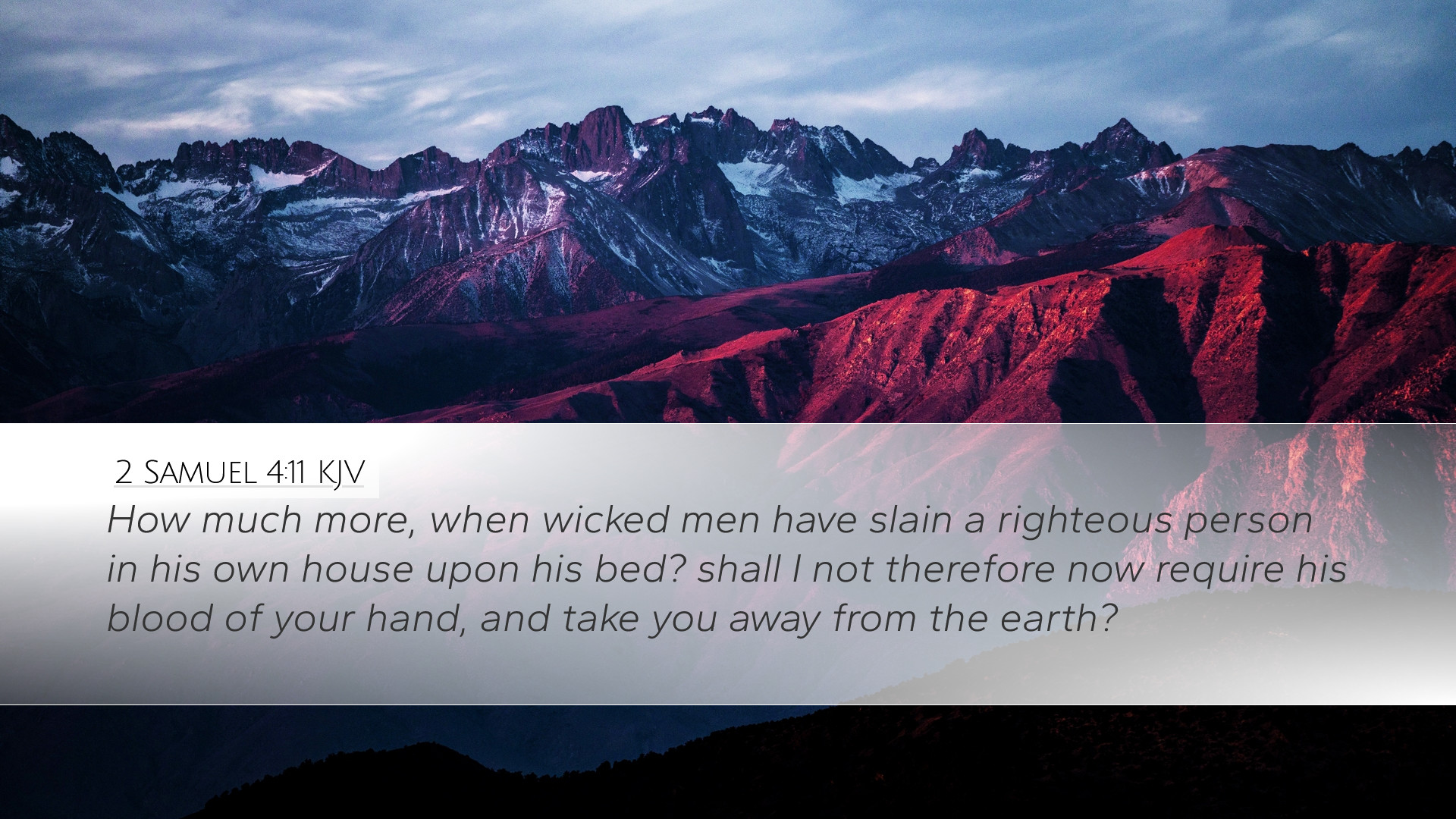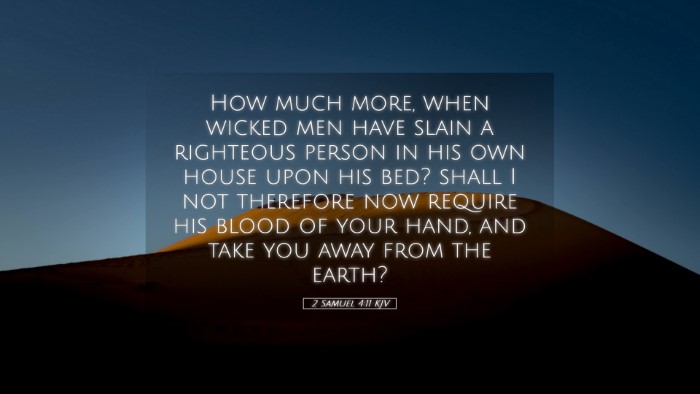Old Testament
Genesis Exodus Leviticus Numbers Deuteronomy Joshua Judges Ruth 1 Samuel 2 Samuel 1 Kings 2 Kings 1 Chronicles 2 Chronicles Ezra Nehemiah Esther Job Psalms Proverbs Ecclesiastes Song of Solomon Isaiah Jeremiah Lamentations Ezekiel Daniel Hosea Joel Amos Obadiah Jonah Micah Nahum Habakkuk Zephaniah Haggai Zechariah Malachi2 Samuel 4:11
2 Samuel 4:11 KJV
How much more, when wicked men have slain a righteous person in his own house upon his bed? shall I not therefore now require his blood of your hand, and take you away from the earth?
2 Samuel 4:11 Bible Commentary
Commentary on 2 Samuel 4:11
Verse: "How much more, when wicked men have slain a righteous person in his own house upon his bed? Shall I not therefore now require his blood of your hand, and take you away from the earth?"
Introduction
The verse comes at a crucial point in the narrative of 2 Samuel, where David, now king over Judah and soon to be king over all Israel, is faced with the aftermath of political treachery. The assassination of Ishbosheth, Saul’s son, signals the chaos that often surrounds transitions of power.
Contextual Background
At the time this verse was written, the political landscape of Israel was fragmented following the death of Saul. Ishbosheth represented the remnants of Saul’s reign, and his assassination by Baanah and Rechab showed the brutality that accompanied political maneuvers. David's condemnation of the act not only serves to differentiate his rule from those who would resort to treachery but also reinforces his character as a man of integrity.
Insights from Matthew Henry
Matthew Henry emphasizes the gravity of murder, particularly when it is committed against a righteous man. He notes that Ishbosheth was slain unjustly while in a vulnerable position, pointing out the moral implications of such actions. Henry comments on God's justice, suggesting that those who commit acts of wickedness will eventually face the consequences of their actions. He states:
"When David heard of this base murder, he condemned it as an act of wickedness, asserting the sanctity of life, especially that of a righteous man."
Albert Barnes’ Commentary
Albert Barnes highlights the irony of the situation—David, known for his righteous conduct, stands against the backdrop of Ishbosheth's murder. Barnes notes that David's response illustrates his commitment to justice:
"David did not seek personal vengeance; rather, he acted as a magistrate, showing the importance of divine justice over human ambition."
He further explains that David's reaction sets the precedent for justice in his reign, establishing a mark of authority grounded in righteousness. The emphasis is placed on the judgment that awaits those who commit heinous acts under the guise of political maneuvering.
Adam Clarke’s Perspective
Adam Clarke approaches the text with a theological lens. He interprets David's words as a call to accountability among leaders:
"David’s assertion here reflects his desire to govern according to God’s laws, indicating that earthly rulers are answerable to a higher moral standard."
Clarke emphasizes the importance of righteous governance, suggesting that leaders should always be wary of how their actions reflect on their leadership. His interpretation poses a critical reflection for contemporary leaders, encouraging integrity and moral fortitude.
Theological Implications
This verse encapsulates a profound theological truth: the seriousness of sin, especially the taking of innocent life. The passage serves as a reminder of the covenant relationship between God and His people, where justice is a central tenet. It also illustrates the weight of accountability that leaders hold before God.
- Justice of God: God's justice is evident in how He administers punishment for wrongdoing, suggesting that all acts of evil will be addressed in due time.
- Moral Authority: David as a leader models the virtues of justice and righteousness, setting a standard for future generations about the moral responsibilities of those in power.
- Character of Leadership: The character of a leader profoundly influences the direction of a nation; David’s expression of grief and horror at Ishbosheth’s murder reinforces the desired characteristics of leaders—integrity, justice, and righteousness.
Application for Today
In contemporary society, where leaders often face moral dilemmas, David’s response offers a model of principled leadership. The lesson learned from his reaction calls for an unwavering commitment to justice, voicing against corruption and treachery. For pastors, students, and theologians, there are practical lessons embedded in this narrative that extend far beyond ancient politics:
- Advocacy for Justice: Engage actively in advocating for justice in communities, representing the righteous call of God against immoral acts and corruption.
- Integrity in Leadership: Emphasize the necessity of integrity in all forms of leadership; personal character and moral decisions should align with godly values.
- Understanding Accountability: Recognize and teach that all actions, especially those affecting others, carry weight in the view of divine accountability.
Conclusion
2 Samuel 4:11 stands as a significant passage that speaks to themes of justice, integrity, and the consequences of wickedness. David's condemnation of Ishbosheth’s murder not only defines his character but also establishes the moral framework for his reign. It challenges readers to consider the implications of their actions in the pursuit of leadership and advocates for a leadership style that prioritizes righteousness and justice.


